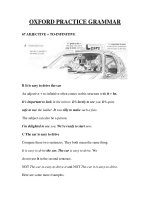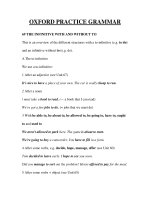Tài liệu OXFORD PRACTICE GRAMMAR 124 pdf
Bạn đang xem bản rút gọn của tài liệu. Xem và tải ngay bản đầy đủ của tài liệu tại đây (84.7 KB, 7 trang )
OXFORD PRACTICE GRAMMAR
124 ADJECTIVE + PREPOSITION, E.G. PROUD OF
A Introduction
Matthew: Why are you angry with me, Emma?
Emma: I'm tired of talking to myself. You never listen. I get annoyed at the
way you behave.
Matthew: Sorry, but I have to go now or I'll be late for the basketball game.
Emma: You aren't interested in us, are you? You never worry about our
relationship, do you?
Some adjectives can have a preposition after them, e.g. angry with, tired of,
late for.
The preposition often has a phrase with a noun or pronoun after it.
annoyed at the way you behave late for the game angry with me
The preposition can sometimes have an ing-form after it.
tired of talking to myself
B Feelings
Here are some examples of adjective + preposition which are to do with
feelings.
afraid of the dark excited about the holiday proud of our work
amazed at/by the changes fed up with waiting satisfied with the result
ashamed of myself fond of my sister shocked at/by the violence
bored with doing nothing happy about/with the surprised at/by the reaction
disappointed with/about the arrangements tired of housework
poor figures keen on sport worried about money
eager for action nervous of flying
Compare these examples.
I'm sorry about the mistake. I feel sorry for poor Melanie.
We were angry at/about the delay. Sarah was angry with Henry.
We were annoyed at/about the delay. Emma was annoyed with Matthew.
I was pleased about winning. The winner was pleased with himself.
Vicky is anxious about her exam. People are anxious for news.
C Good, bad, etc
To talk about a person's ability, we use good at, bad at, etc.
good at tennis brilliant at crosswords bad at games hopeless at cooking To
talk
about whether something makes you healthy or ill, we use good for and bad
for.
Oranges are good for you. Smoking is bad for you. For behaviour towards
another person,
we use good to, kind to, nice to, polite to and rude to.
My friends have been good to me. You were very rude to the waitress.
D Other adjectives
Here are some more expressions with other adjectives.
accustomed to the noise fit for work responsible for running a business
aware of the facts full of water safe from attack
capable of looking after myself guilty of murder the same as before
different from our usual route involved in a project similar to my idea
(see page 381) prepared for action typical of David
famous for her film roles ready for the big day used to the traffic
71 Afraid, anxious, ashamed, interested, sorry 72 Used to
124 EXERCISES
1 Feelings (A-B)
Say what these people's feelings are. Use the adjectives in brackets and a
preposition.
► The children are leaving on a trip to the zoo. (excited) They're excited
about the
trip to the zoo.
1 Vicky doesn't like the dark, (afraid)
She's
………………………………………………………………………………
……………………………
2 Nick was watching a video, but he's going to switch it off. (bored)
He's
………………………………………………………………………………
…………………………….
3 Emma is reading about computers, (interested)
She's
...........................................................................................................................
.................................
4 Mark has just heard some news that he didn't expect, (surprised)
He's
...........................................................................................................................
..................................
5 United have won a victory, (proud)
They're
...........................................................................................................................
............................
6 Olivia's children are being very silly, (annoyed)
She's
………………………………………………………………………………
…………………………….
7 The Zedco staff don't think their pay increase is big enough, (not satisfied)
………………………………………………………………………………
……………………………
2 Good, bad, etc (C)
Complete the conversation. Put in at, for or to.
Sarah: You were very rude (►) to Henry when you said he needs to lose
weight.
Claire: Well, it's true. Exercise would be good (1)………… . him. He started
jogging and then gave it up.
Sarah: Yes, but we can't all be good (2)................ taking physical exercise.
Claire: Anyone can do a bit of jogging. You don't have to be brilliant
(3)…………… it.
And eating so much must be bad (4) ............... you.
Sarah: Well, you could have been more polite.
Claire: Sorry. I'm not very good (5)................. saying the right thing.
I'll try to be nice (6) .............him next time I see him.
3 Other adjectives (A, D)









